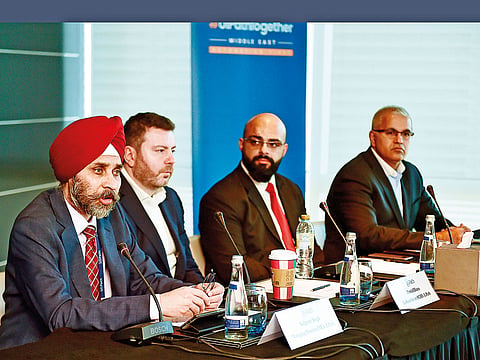Mideast braces for large-scale robotic process automation deployment
UiPath to partner with universities towards a curriculum enhanced by automation and AI

Dubai: The uptake of Robotic Process Automation (RPA) by businesses in the Middle East has been slow but they are on the verge of making large deployments, the CEO of a Romanian start-up said.
RPA is the use of software with artificial intelligence (AI) tools to automate high-volume and repetitive manual tasks in the enterprise sector that previously required human input.
Daniel Dines, co-founder and CEO of robotic software platform UiPath, said that RPA helps enterprises raise their productivity, compliance and process efficiency levels.
According to research firm Gartner, global spending on RPA software is estimated to grow 57 per cent year-on-year to $680 million (Dh2.5 billion) this year and 57 per cent over the next year — en route to touching $2.4 billion in 2022.
Dines said that Dubai is the right example as it has voiced its determination to go paperless by 2021.
“A few years ago, ‘mobile first’ was the mantra and then came ‘cloud first’ but according to me, it should be ‘automation first’. Automation is a mindset to make your processes more agile as [the] RPA software robot makes zero mistakes and costs a lot less than an employee,” he said.
He, however, does not believe that AI will overtake human jobs but, instead, says it will augment humans.
According to Gartner, AI will create 2.3 million jobs in 2020, while eliminating only 1.8 million jobs.
“The ‘One Million Arab Coders’ initiative by the Dubai Future Foundation bodes well with us and my intention is to have one million students and one thousand schools with RPA — globally — in the next three years,” Dines said.
In the region, he said UiPath will be partnering with Blackboard Educational Technology and Services to set up centres supporting several regional universities towards a curriculum enhanced by automation and AI.
Dines said that software robots are easy to train and they integrate seamlessly into any system, adding that the process is as easy as learning Microsoft Excel.
“The development of the software is not as complicated as Java and can be learnt easily,” he said.
Karan Dixit, vice-president for UiPath Middle East and Africa, said that the biggest adopters of RPA are banks, insurance companies, retail, logistics, utilities and telecommunications companies.
“We are already in talks with government entities in the region that want to take a lot of manual elements that their employees are stuck in automating.”
Sign up for the Daily Briefing
Get the latest news and updates straight to your inbox



